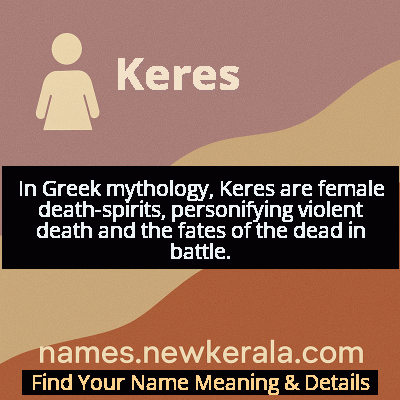Keres Name Meaning & Details
Origin, Popularity, Numerology Analysis & Name Meaning of Keres
Discover the origin, meaning, and cultural significance of the name KERES. Delve into its historical roots and explore the lasting impact it has had on communities and traditions.
Name
Keres
Gender
Female
Origin
Greek
Lucky Number
4
Meaning of the Name - Keres
In Greek mythology, Keres are female death-spirits, personifying violent death and the fates of the dead in battle.
Keres - Complete Numerology Analysis
Your Numerology Number
Based on Pythagorean Numerology System
Ruling Planet
Uranus (Rahu)
Positive Nature
Strong sense of order, loyal, practical, and disciplined.
Negative Traits
Stubborn, overly serious, rigid, and prone to feeling restricted.
Lucky Colours
Blue, gray.
Lucky Days
Saturday.
Lucky Stones
Blue sapphire.
Harmony Numbers
1, 7, 8.
Best Suited Professions
Managers, engineers, accountants, organizers.
What People Like About You
Dependability, discipline, practicality.
Famous People Named Keres
Keres of Greek Mythology
Mythological Spirits
Personified violent death and fate in battle, featured prominently in Homer's Iliad
Paul Keres
Chess Grandmaster
One of the strongest chess players never to become World Champion, known as 'The Crown Prince of Chess'
Keres Hiie
Estonian Poet
Modern Estonian poet who has used mythological themes in her work
Name Variations & International Equivalents
Click on blue names to explore their detailed meanings. Gray names with will be available soon.
Cultural & Historical Significance
Extended Personality Analysis
The personality traits associated with the name Keres draw heavily from their mythological origins as determined, relentless spirits of fate. Individuals with this name might be perceived as intense and deeply philosophical, possessing a strong understanding of life's darker aspects. They often demonstrate remarkable resilience and the ability to confront difficult truths that others might avoid. Their mythological connection suggests someone comfortable with complexity and ambiguity, who doesn't shy away from challenging situations. There's often an air of mystery surrounding them, combined with a pragmatic approach to life's inevitable challenges. They tend to be fiercely independent thinkers who march to their own drum, unswayed by conventional opinions or social pressures. At their best, they embody the courage to face necessary endings and transformations, understanding that growth often comes through confronting what we fear most. However, they might struggle with being perceived as too intense or morbid by those who don't share their depth of perspective.
Modern Usage & Popularity
In contemporary naming practices, Keres remains an exceptionally rare choice, primarily confined to families with strong connections to classical studies, mythology enthusiasts, or members of pagan and reconstructionist religious communities. The name's dark associations with violent death make it challenging for mainstream adoption, though this very quality appeals to those seeking names with powerful, unconventional meanings. Its usage patterns show occasional spikes following popular media featuring Greek mythology, such as the Percy Jackson series or the video game Hades. In Estonia, where it functions as a surname, it carries no negative connotations and is associated with national pride through chess legend Paul Keres. The name sees slightly more usage in fantasy literature as a character name, where its mythological weight adds depth to fictional personas. Current naming trends suggest that as society becomes more accepting of unconventional names with dark aesthetics, Keres may see gradual increase in usage, particularly among parents seeking unique mythological names beyond the more common Athena or Apollo.
Symbolic & Spiritual Meanings
The Keres carry profound symbolic weight as representations of inevitable fate and the aspects of existence that cannot be avoided or negotiated. They symbolize the concept that certain outcomes are predetermined and must be faced with dignity and courage. Metaphorically, they represent the challenges, losses, and transformations that ultimately shape human character and destiny. In psychological terms, they can be seen as manifestations of the shadow self - those difficult aspects of our nature and experience that we must integrate to achieve wholeness. The Keres also symbolize the tension between human agency and cosmic determinism, reminding us that while we have free will, there are larger forces at play in our lives. Their association with blood and battle gives them additional symbolism related to sacrifice, the costs of conflict, and the price of glory. In modern interpretation, they can represent the necessary endings that make new beginnings possible, and the courage required to accept life's harsher truths without being destroyed by them.

